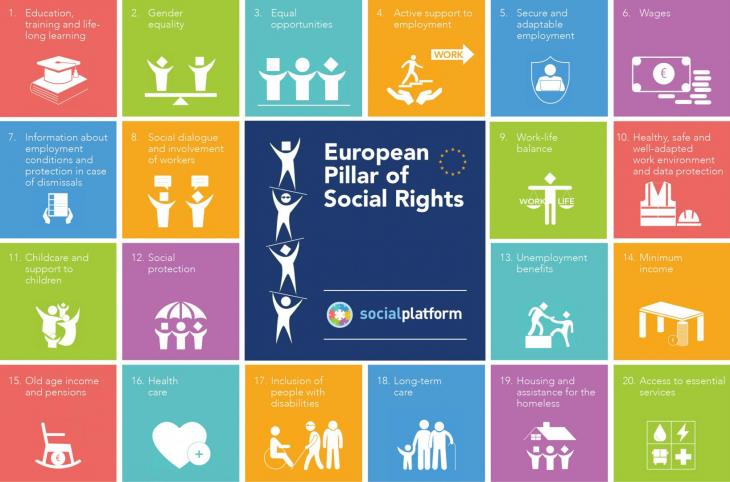The European Pillar of Social Rights: Turning principles into actions
The European Parliament, the Council and the Commission proclaimed the European Pillar of Social Rights at the Gothenburg Summit in 2017. The Pillar sets out 20 key principles and rights essential for fair and well-functioning labour markets and welfare systems in the 21st century. The Pillar is structured around three chapters:
(1) Equal opportunities and access to the labour market;
(2) Fair working conditions;
(3) Social protection and inclusion.
The Commission has set out its ambitions for a strong social Europe that focuses on jobs and skills for the future and paves the way for a fair, inclusive, and resilient socio-economic recovery.
The European Pillar of Social Rights Action Plan outlines concrete actions to be implemented as a joint effort by the Members States and the EU to further the principles of the European Pillar of Social Rights, with active involvement of social partners and civil society. It also proposes employment, skills, and social protection headline targets for the EU to be achieved by 2030.
This is an opportunity for Europe to update its social rulebook, while successfully navigating the transformations brought about by new societal, technological, and economic developments and by the socioeconomic consequences of the pandemic. The Commission has already started to put the Pillar's principles into action, proposing initiatives such as youth employment support and adequate minimum wages in 2020. Today, the Commission is also presenting a Commission Recommendation on Effective Active Support to Employment following the COVID-19 crisis (EASE) to support a job-rich recovery.
Executive Vice-President of An Economy that Works for People, Valdis Dombrovskis, said: “Our economic recovery must be inclusive, fair and job-rich. That is why the Commission is proposing an ambitious agenda for implementation of the European Pillar of Social Rights and inviting Member States to actively support employment in the recovery phase following the COVID-19 crisis. With this, we want to signal the importance of a gradual transition from emergency to recovery policies for our labour markets, which the EU will support through its available funding sources, including the ESF+ and the Recovery and Resilience Facility.”
Commissioner for Jobs and Social Rights, Nicolas Schmit, said: “The European Pillar of Social Rights has been our reference point for building a strong social Europe. Now we breathe new life into it, turning its principles into actions. Creating jobs is one of our main priorities, and making sure people have the right skills for those jobs. This is the objective of EASE. We also have a collective duty to combat poverty in the EU and create an inclusive society. We all have a role to play. I look forward to a renewed commitment to social rights at the Social Summit in May.”
EU targets for a common ambition by 2030
The Action Plan sets three headline targets for the EU, to be achieved by 2030:
- At least 78% of people aged 20- to 64-years-old should be in employment;
- At least 60% of all adults should participate in training every year;
- The number of people at risk of poverty or social exclusion should be reduced by at least 15 million.
Read the full press release here.
